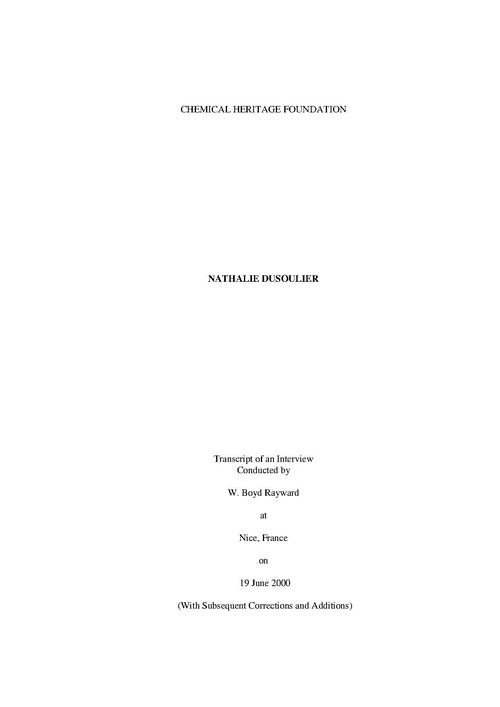Interview Dusoulier (2000) Rayward : Différence entre versions
(→ABSTRACT) |
|||
| Ligne 5 : | Ligne 5 : | ||
Cette page introduit une interview de [[Nathalie Dusoulier]] par [[Warden Boyd Rayward|W. Boyd Rayward]]. Elle a été donnée à [[A pour localité citée::Nice]] en 2000 dans le cadre des activités du ''Chemical Heritage Foundation''. | Cette page introduit une interview de [[Nathalie Dusoulier]] par [[Warden Boyd Rayward|W. Boyd Rayward]]. Elle a été donnée à [[A pour localité citée::Nice]] en 2000 dans le cadre des activités du ''Chemical Heritage Foundation''. | ||
| − | == | + | ==Résumé== |
| + | {{Corps article/Début}} | ||
Nathalie Dusoulier begins her interview by discussing her family background and education. She recounts how she started working in information science from her background in pharmacology. She then speaks about her employment at Centre National de la Recherche Scientifique [CNRS]. She describes the number of different forms her career at CNRS took, from indexing articles to directing the biology and human science sections | Nathalie Dusoulier begins her interview by discussing her family background and education. She recounts how she started working in information science from her background in pharmacology. She then speaks about her employment at Centre National de la Recherche Scientifique [CNRS]. She describes the number of different forms her career at CNRS took, from indexing articles to directing the biology and human science sections | ||
of CNRS’s publication, <i>Bulletin Signalétique</i>. She talks about the different methods used to index and her first experiences with automation and computing. Dusoulier then segues into discussing the commercialization of Institut de l’Information Scientifique et Technique [INIST] and its collaborations with various international organizations. She then speaks about a variety of other information science organizations including International Council of Scientific Unions Abstracting Board [ICSU AB], Un | of CNRS’s publication, <i>Bulletin Signalétique</i>. She talks about the different methods used to index and her first experiences with automation and computing. Dusoulier then segues into discussing the commercialization of Institut de l’Information Scientifique et Technique [INIST] and its collaborations with various international organizations. She then speaks about a variety of other information science organizations including International Council of Scientific Unions Abstracting Board [ICSU AB], Un | ||
| Ligne 12 : | Ligne 13 : | ||
Dusoulier’s interview continues with details of her employment at INIST. She talks | Dusoulier’s interview continues with details of her employment at INIST. She talks | ||
about her transition from the United Nations and moving to Nancy, France to set up INIST. She talks about hiring INIST’s staff and setting up the center. She continues her earlier discussion about commercialization of information and INIST by talking about INIST Diffusion. She concludes her interview by talking about recent changes in technology and their impact on information science. | about her transition from the United Nations and moving to Nancy, France to set up INIST. She talks about hiring INIST’s staff and setting up the center. She continues her earlier discussion about commercialization of information and INIST by talking about INIST Diffusion. She concludes her interview by talking about recent changes in technology and their impact on information science. | ||
| − | + | {{Corps article/Fin}} | |
Version du 11 avril 2021 à 16:42
Cette page introduit une interview de Nathalie Dusoulier par W. Boyd Rayward. Elle a été donnée à Nice en 2000 dans le cadre des activités du Chemical Heritage Foundation.
Résumé
Nathalie Dusoulier begins her interview by discussing her family background and education. She recounts how she started working in information science from her background in pharmacology. She then speaks about her employment at Centre National de la Recherche Scientifique [CNRS]. She describes the number of different forms her career at CNRS took, from indexing articles to directing the biology and human science sections of CNRS’s publication, Bulletin Signalétique. She talks about the different methods used to index and her first experiences with automation and computing. Dusoulier then segues into discussing the commercialization of Institut de l’Information Scientifique et Technique [INIST] and its collaborations with various international organizations. She then speaks about a variety of other information science organizations including International Council of Scientific Unions Abstracting Board [ICSU AB], Un ited Nations Educational, Scientific and Cultural Organization Programme Générale d’Information [UNESCO PGI], Federation for Information and Documentation [FID], and the International Federation of Library Associations and Institutions [IFLA].
Dusoulier’s interview continues with details of her employment at INIST. She talks about her transition from the United Nations and moving to Nancy, France to set up INIST. She talks about hiring INIST’s staff and setting up the center. She continues her earlier discussion about commercialization of information and INIST by talking about INIST Diffusion. She concludes her interview by talking about recent changes in technology and their impact on information science.

